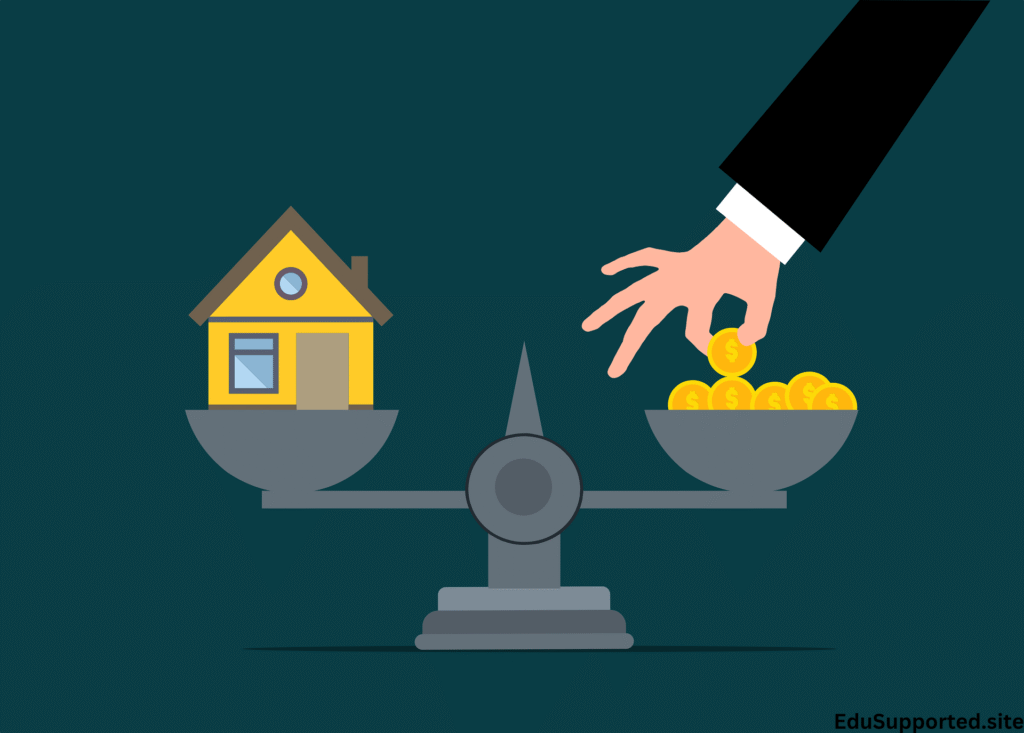Making extra payments on student loans or a mortgage is a common dilemma that people face while managing their own money. Several factors, including interest rates, financial goals, and overall debt management, come into play when deciding which major financial obligation to tackle first—student loans or home debt—or whether to raise payments on either.
To help you make an informed decision that works for your budget, we will compare the pros and cons of increasing mortgage payments vs paying down student loans.
Realising That Mortgage Debt Is Different From Student Loan Debt
Before deciding how to allocate more capital, it is essential to understand the key differences between mortgages and student loans.
Mortgage Loans
-
Your home is used as security for mortgage loans, so if you don’t pay them back, they could foreclose on your property.
-
Interest Rate Reductions: Compared to other types of consumer loans, mortgage rates are typically 3-6 percentage points cheaper.
-
Mortgage terms typically range from fifteen to thirty years, making them long-term loans.
-
Advantages for Your Taxes: If you are able to deduct your mortgage interest, it might reduce your effective interest expenditure.
Student Loans
-
Student loans are considered unsecured debt, but there are significant legal consequences for not paying them back.
-
Interest Rates Vary: While federal student loans typically have fixed rates (about 4-7%), private student loans might have variable or even higher rates.
-
Forgiveness and income-driven repayment plans are two of the many repayment choices available for federal loans.
-
There are no tax benefits associated with taking out a student loan. You may deduct a portion of your mortgage interest, but only up to a specified limit.
Increasing Debt Payments: What Are the Benefits?
You may reduce the total amount of interest you pay on your home or student loans over time by making extra payments. This can help you pay off your debt faster. Here are some reasons why you may want to think about making extra payments:
-
Cut Down on Interest: Paying down the principal debt with additional payments lowers the interest you pay.
-
Get Out From Under Your Debt Faster: Your credit score and your ability to spend freely will both benefit from a reduction in your debt load.
-
Reduce stress and financial danger by paying off debt to strengthen your financial security.
-
Mortgages Help Build Equity: If you’re planning to sell or refinance your house, increasing your mortgage payments might be a good move since they speed up the process of building equity.
Will Extra Mortgage Payments Be Necessary?
It could be prudent to pay more towards your mortgage in some cases. Some benefits and considerations are as follows:
Benefits of Increasing Mortgage Payments
-
Interest Declining With Time: Mortgage interest is calculated on the remaining loan amount, so if you pay more each month, the principle will decrease and you will pay less interest in the future.
-
Rapidly Grow Your Equity: Making extra payments speeds up the process of increasing your home’s equity, which might increase your financial independence via refinancing or a home equity loan.
-
Peace of mind: Paying off your mortgage early may be a financial and emotional relief since it eliminates a large monthly payment.
-
The capacity to foretell: Your extra payment savings will be consistent and predictable since interest rates on most mortgages are set.
Consider Making Extra Mortgage Payments When
-
You have a low-interest mortgage and would want to pay it off faster.
-
You have maxed out your contributions to your retirement and emergency savings accounts.
-
At this time, you are not carrying any additional high-interest loan.
-
Staying around for the long haul will allow you to reap the rewards of equity development to the fullest.
Downsides of Extra Mortgage Payments
-
The opportunity cost of increasing mortgage payments is that you could be putting money that would have been better spent on a low-interest loan somewhere else.
-
Assets in real estate are not as liquid as other types of capital, such as cash or other assets.
-
Mortgage interest deductions could be reduced if you pay off your loan early, which might reduce your tax benefits.
Will Extra Payments Be Required for My Student Loans?
Extra payments might have substantial consequences since student loans are a big source of debt for a lot of individuals.
Benefits of Paying Off Student Loans at a Higher Rate
-
Minimise High-Interest Debt: Particularly for private loans, interest rates on student loans could be higher than mortgage rates. Extra payments on a loan can end up saving you a tonne of money in the long run.
-
Raise Your FICO Score: Decrease the amount you owe on your student loans to boost your credit utilisation rate and overall creditworthiness.
-
Simplify Your Financial Life: Paying off student loans early might increase financial independence by lowering monthly payments.
-
Refrain from profiting from your passion: Accrued interest on certain student loans is capitalised to raise the principal. Additional costs could make this unnecessary.
When Should You Consider Making Extra Payments on Your Student Loans?
-
Your mortgage interest rate is lower than the interest rate on your student loans.
-
Debt forgiveness programs do not apply to you, and you are not participating in an income-driven repayment plan.
-
Paying off your debt rapidly can help you become financially independent.
-
There are no other obligations that you have that carry a greater interest rate.
Negative Aspects of Increasing Payments on Student Loans
-
While there are protections for federal student loans, such as income-driven repayment plans and deferral, the more payments you make, the less flexibility you may have in the event that you have future financial troubles.
-
Possible Pardon: If you pay off your loans early, you may not be able to qualify for forgiveness via programs like Public Service Loan Forgiveness.
-
While paying off a home can create equity and a tangible asset, paying off student loans does not.
Which Is Better: A Mortgage or Student Loans?
If you are trying to decide whether or not to make extra payments on your home or student loans, here is a systematic approach:
1. Look at the Rates of Interest
The higher interest rate loan should usually be paid off first since it makes more financial sense. One example is:
-
If the interest rate on your student loans is 6% and your mortgage rate is 4%, you will need to make extra payments towards your student loans.
-
However, if your mortgage interest rate is higher than your student loan interest rate, you may want to consider making extra payments towards your mortgage.
2. Evaluate Tax Benefits
Think about all of your tax deductions, especially the ones for mortgage interest. The reduced after-tax cost of a mortgage may sometimes sway your decision.
3. Consider the Loan Terms and Flexibility
Particularly with federal student loans, there are additional options for repayment and protections. A mortgage does not provide such a service.
4. Assess Your Financial Goals
-
Are you planning to retire debt-free? Pay your mortgage on time.
-
Do you wish there was a faster way to eliminate all of your unsecured debt? Prioritise paying off school loans.
5. Evaluate Your Cash on Hand and Emergency Funds
You should save enough for retirement and an emergency fund to cover three to six months of expenses before you take out any further loans.
Real-World Examples
Example 1: Mortgage Rate at 3.5% and Student Loan Rate at 6.8%
It would likely be better to pay more towards student loans in this case since the higher interest debt accumulates faster.
Example 2: Mortgage Interest Rate of 5.5% and Student Loan Interest Rate of 4.5%
Making greater mortgage payments over a longer period of time will reduce interest costs.
Things to Think About Beyond Financing
-
Extra payments would be even more advantageous if you could refinance your mortgage or student loans to get a reduced interest rate. Check the rates to see whether it’s a good time to refinance.
-
Save for Rainy Days and Investments: Make sure you have enough money saved up before you put any more money into debt. Another consideration when deciding whether or not to invest is if the expected return exceeds the interest rates on your debts.
-
Emotional Elements: For some, paying off their home is the top priority, while for others, it’s paying off their student debts.
In Conclusion
You could have to put more money down on your home or student loans depending on your specific financial situation, interest rates, possible tax implications, and long-term goals. I will give you the gist of it:
-
You should start by paying more towards the debt at the new, higher interest rate.
-
Think about how mortgage interest may save you money on taxes.
-
Keep in mind the several options for resolving and adjusting student loan debt.
-
Prioritise preparing for retirement and an emergency fund.
-
Think about your financial goals and your emotional tendencies.
If you’re unsure of how to best maximise your financial health by repaying your debt, consulting a financial professional may be a good first step.
